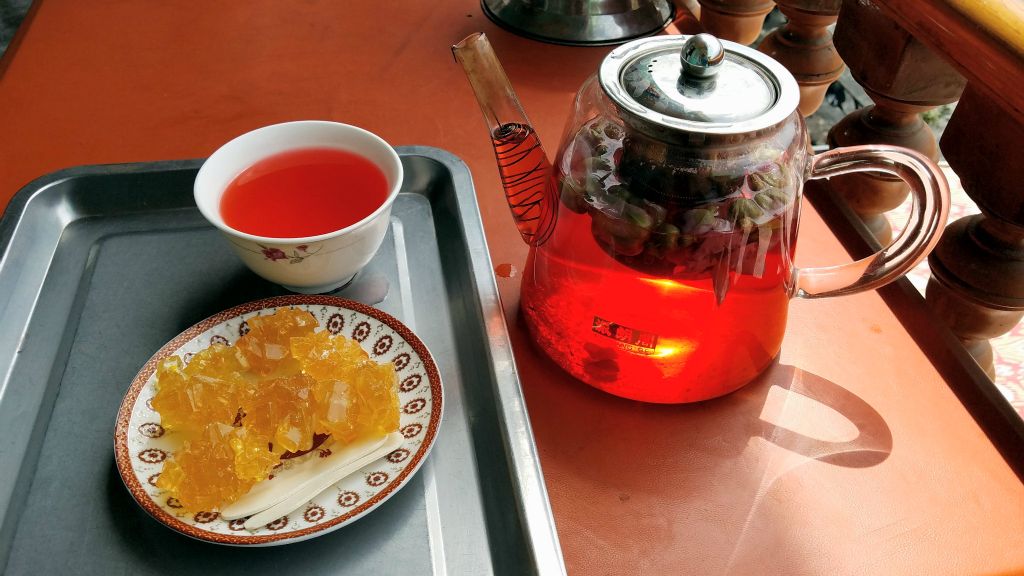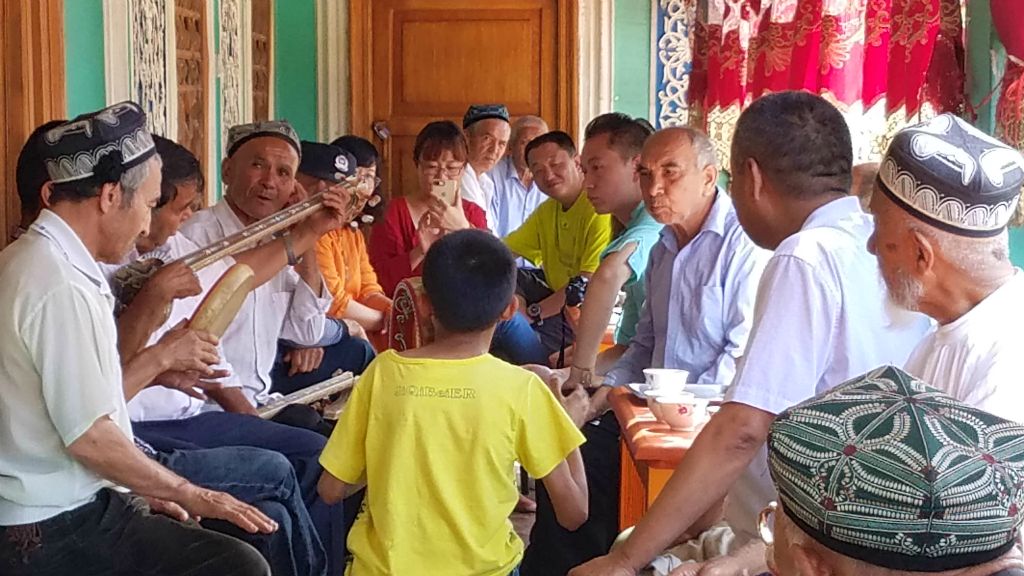What does one do on a blazing hot summer’s day in Kashgar? Wandering is certainly an option. I started walking around Old Town when I came upon an interesting-looking structure that I learned was the Ostangboyi Tea House. It was apparently a century old and one of, if not the last, traditional teahouses in Kashgar. As tea is important in Uyghur culture and I wanted to get out of the oppressive afternoon heat, I stepped inside.
Walking up the wooden steps, I came upon a big hall. In it, Uyghur men sat everywhere, sipping tea from their cups and eating Uyghur “nan“, a kind of flatbread commonly found in Xinjiang. I could hear music being played outside so I went to the balcony area to see if I could find an empty seat and found one. The teahouse didn’t hand out menus so I went inside again and saw a table with a man behind it who looked like he was in charge. On his table was a menu that had Arabic, Chinese, but also English. I guess this teahouse was quite popular with tourists so they were prepared. I didn’t know what tea was good so I randomly picked one, a rose-bud tea if I recall correctly, which cost maybe $2-3 USD for a pot. I don’t recall if the man in charge spoke broken English to me or if I communicated in my crude Mandarin along with pointing to the item of choice but bottom line, the tea was ordered.
I went back to my table and before-long, the tea arrived on a tray. It was a pale translucent red color. The pot contained what I assumed were rose buds. Also on the tray was a plate of orange-colored crystallized rock sugar. I figured the obvious thing to do was to break off a piece of sugar and add it to my cup before pouring some tea on it. This produced a smooth, mildly sweet tea with a hint of rose scent. I liked it.

As I enjoyed my tea, I listened to a man play his “rawap“, a traditional Uyghur instrument. Another man accompanied with a finger drum and a boy played the tambourine. People gathered around them to listen or to sing along. I was not sure if this was a spontaneous occurrence or if it was a show put on for the group of Chinese tourists who had arrived not too long before. In any case, it was a unique sound to my ears and I enjoyed it.

A Chinese man at a table next to mine chatted me up in Mandarin but I told him I wasn’t a local and that my Mandarin was terrible. (No matter where I travel, I always learn how to say “I cannot speak your language” in the local language, which sometimes throws people off.) We tried to converse anyway. He mentioned he was from somewhere in eastern China (the name of the city slips my mind as I write this) and I told him I was originally from Malaysia but live in the USA. We agreed to try each other’s teas as his looked like a different variety. The man’s wife also joined in and I told them to have more of my tea as a whole pot was quite a lot for one person. At one point, the man’s wife said she liked the rock sugar that came with the tea and packed it to-go. I asked them if they wanted mine as well and they happily took it. I have to say, I don’t blame them, the rock sugar didn’t look like anything I’ve come across in many markets I’ve visited. It could very well have been something local to Xinjiang. After a while, they said their goodbyes and left.
After finishing my pot of tea, paying the man in charge inside and thanking him with a “Rakhmat” (“Thank you” in Uyghur), I braved the heat and headed out to explore more of Kashgar.